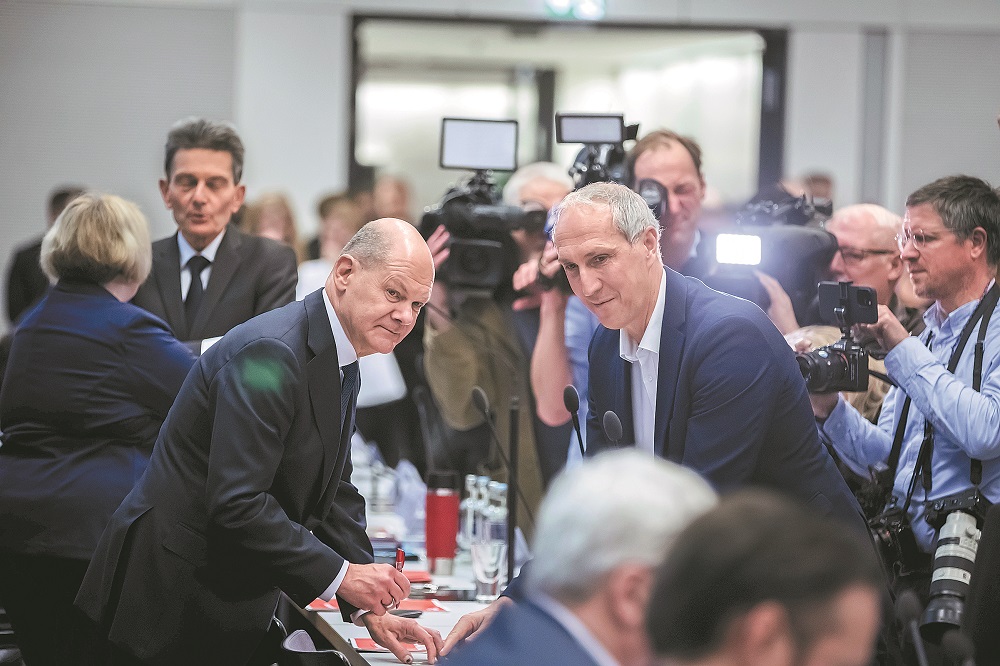(Source:China Daily,2024-12-18) German Chancellor Olaf Scholz (center left) talks at the start of a special meeting of the Social Democratic Party parliamentary group after losing the vote of confidence in the parliament in Berlin on Monday. CHRISTOPH SOEDER/AP German Chancellor Olaf Scholz lost a confidence vote on Monday, paving the way for an early election in February. The crisis adds to the woes of the faltering German economy, casting uncertainties over a country that has long been regarded as the stabilizing anchor of the European Union, experts say. Scholz received support from 207 lawmakers in the Bundestag, the lower house of the German parliament, while 394 voted against him and 116 abstained. Scholz, expecting to lose, requested the confidence vote last week, invoking Article 68 of the Basic Law. Scholz led a minority government after his three-party coalition collapsed on Nov 6, following the dismissal of Finance Minister Christian Lindner over disagreements regarding the budget to revitalize the economy. Leaders of several major parties agreed that a parliamentary election should be held on Feb 23, seven months earlier than planned. While Lindner's departure triggered the vote, the underlying issue is the long-standing disagreement over economic and fiscal policies within the coalition, said Wu Huiping, deputy director of the German Studies Center at Tongji University. The fragmentation and rising polarization of the political landscape have worsened Germany's economic and social problems, including those related to migrants, she told China Daily. The political turbulence hit Germany as it struggled to revive a stuttering economy hammered by high energy prices, especially after the Ukraine crisis. The German central bank slashed its growth forecast for next year to 0.2 percent, from the 1.1 percent it had predicted in June. It also said it now expected the economy, which shrank by 0.3 percent in 2023, to contract by 0.2 percent this year. To make matters worse, large German companies have made job cut announcements and plant closure plans to accommodate the rising manufacturing costs. The root cause of the vote failure lies in the poor status of the economy. Germany's political instability has severely hindered economic recovery, eroding investor confidence and increasing societal uncertainty, said Jian Junbo, deputy director of the Center for China-Europe Relations at Fudan University's Institute of International Studies. The automotive industry, for example, is experiencing relative shrinkage domestically, highlighting the need to maintain the advantages of the traditional industry while building up innovation, he told China Daily. Following the confidence vote failure, Scholz met with President Frank-Walter Steinmeier to recommend the dissolution of the Bundestag. Steinmeier is expected to approve it after Christmas and call for a snap election. 'Vacancy' period This means no major policies or laws will be passed during this 'vacancy' period. Uncertainties will persist, further exacerbated by the external environment, including the potential for new tariffs with US President-elect Donald Trump taking office, Wu said. The focus has now shifted to the election campaign, which is now in full swing, she said. The main political parties were expected to present their election programs on Tuesday. Scholz was nominated on Nov 25 as the Social Democratic Party, or SPD, candidate for chancellor in the next election. The other three candidates are Christian Democratic Union leader Friedrich Merz, current Vice-Chancellor Robert Habeck from the Green Party, and Alice Weidel of the Alternative for Germany, or AfD. The conservative CDU-CSU bloc is polling around 31-32 percent, with the far-right AfD polling at around 18-19 percent and SPD trailing at 16-17 percent, Agence France-Presse reported. Scholz will continue to serve in a caretaker role until a new government is formed, a process that could take months if the coalition talks prove to be lengthy. Whichever party leads the new government, the current challenges will continue to exist, largely shaped by the Russia-Ukraine conflict and economic development issues, Jian from Fudan University said. Berlin's troubles come as its main EU partner France is also mired in a government crisis, and President Emmanuel Macron named centrist ally Francois Bayrou as its new prime minister just days ago. With both Germany and France facing internal crises, their ability to push for reforms in Brussels or advance European integration is limited. This undermines the EU's cohesion and strategic autonomy, Jian said.
Jian Junbo,Germany's Scholz loses confidence vote
发布时间:
2024-12-18
访问次数:
10
